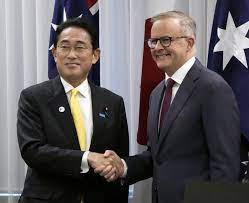Loading
Search
▼ Japan, Australia In Talks On Cooperation In Military Contingencies
- Category:Other
Japan and Australia are discussing potential military cooperation in case of simultaneous contingencies in their nearby regions, government sources said Monday, apparently with China's growing maritime assertiveness in mind.
Through the discussion and the development of examples of collaboration between the Japan Self-Defense Forces and the Australian military, Tokyo envisions establishing bilateral defense cooperation guidelines with Canberra to clarify their role-sharing, the sources added.
Increasing the sophistication and frequency of joint drills between the two forces is also likely to be brought up in the talks, the sources said, in a move expected to enhance deterrence against Beijing's provocative military activities in the Indo-Pacific region.
The working-level consultation was launched based on a joint declaration on security cooperation, signed by Japanese Prime Minister Fumio Kishida and his Australian counterpart Anthony Albanese when they met in October 2022 in Australia.
In the document, the two leaders pledged to "consult each other on contingencies that may affect our sovereignty and regional security interests" and "explore additional ways to improve the effectiveness of our bilateral security and defense cooperation."
The governments have explored collaborative strategies, including scenarios where emergencies arise simultaneously in both the East and South China Seas, according to the sources.
While the sides have been strengthening their defense partnership in recent years, Tokyo has also asked for Canberra's cooperation in using Australia's vast continent as a testing ground for Japanese missiles that are under development, the sources added.
Japan has promised to acquire "counterstrike capabilities" in late 2022 by developing homemade long-range missiles, along with procuring U.S.-produced Tomahawk cruise missiles, as a deterrent against regional security threats including those from North Korea.
In August, their bilateral reciprocal access agreement came into effect, enabling quicker unit deployment between the two forces. It was the first RAA for Tokyo other than a similar pact with the United States, called the Status of Forces Agreement.
Japan views Australia as a "quasi-ally," in addition to its sole security treaty ally the United States, which is also the only nation with which it has bilateral defense cooperation guidelines.
Through the discussion and the development of examples of collaboration between the Japan Self-Defense Forces and the Australian military, Tokyo envisions establishing bilateral defense cooperation guidelines with Canberra to clarify their role-sharing, the sources added.
Increasing the sophistication and frequency of joint drills between the two forces is also likely to be brought up in the talks, the sources said, in a move expected to enhance deterrence against Beijing's provocative military activities in the Indo-Pacific region.
The working-level consultation was launched based on a joint declaration on security cooperation, signed by Japanese Prime Minister Fumio Kishida and his Australian counterpart Anthony Albanese when they met in October 2022 in Australia.
In the document, the two leaders pledged to "consult each other on contingencies that may affect our sovereignty and regional security interests" and "explore additional ways to improve the effectiveness of our bilateral security and defense cooperation."
The governments have explored collaborative strategies, including scenarios where emergencies arise simultaneously in both the East and South China Seas, according to the sources.
While the sides have been strengthening their defense partnership in recent years, Tokyo has also asked for Canberra's cooperation in using Australia's vast continent as a testing ground for Japanese missiles that are under development, the sources added.
Japan has promised to acquire "counterstrike capabilities" in late 2022 by developing homemade long-range missiles, along with procuring U.S.-produced Tomahawk cruise missiles, as a deterrent against regional security threats including those from North Korea.
In August, their bilateral reciprocal access agreement came into effect, enabling quicker unit deployment between the two forces. It was the first RAA for Tokyo other than a similar pact with the United States, called the Status of Forces Agreement.
Japan views Australia as a "quasi-ally," in addition to its sole security treaty ally the United States, which is also the only nation with which it has bilateral defense cooperation guidelines.
- January 15, 2024
- Comment (0)
- Trackback(0)


